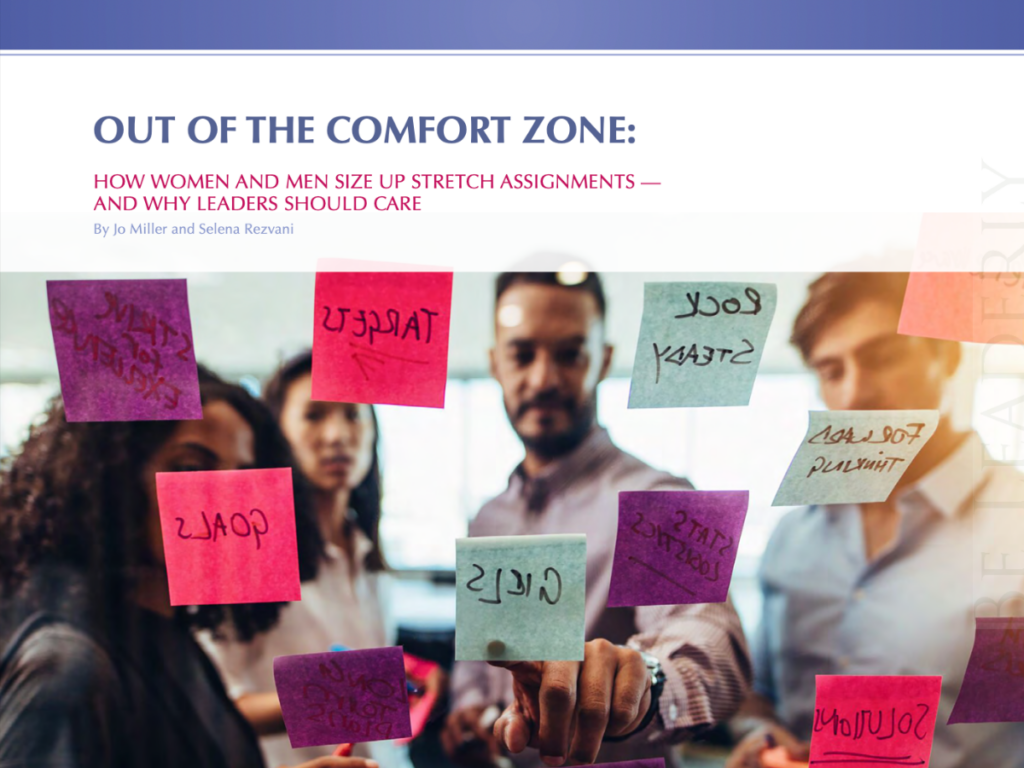Out of the Comfort Zone: How women and men size up stretch assignments — and why leaders should care.
January, 2019: Stretch opportunities are all the rage in the workplace. But as popular as they are, it’s unclear why some people decide to accept a stretch assignment or role – and others step aside. It’s also unclear why women haven’t benefited from stretches as much as men. This report shares our original research on how both genders decide if they are ready for a stretch, and how they make that decision. We also explore how employers can create a workplace that supports employees who step out of their comfort zones. For individuals – and women in particular – we offer advice for getting the most out of these career-making opportunities.
What is a “stretch opportunity?”
- A stretch assignment is a temporary, internal learning opportunity that helps an employee acquire new expertise.
- A stretch role is a new, permanent position that challenges an employee to expand responsibilities or learn new skills.
Key Research Findings
- Men and women are equally interested in being promoted into director or vice president positions and ultimately advancing into senior vice president or C-suite roles.
- However, the largest portion of women don’t feel their employers make it easy to gauge if they are ready for a promotion, while the largest portion of men think their employers help them know whether they are prepared to advance.
- Women are less engaged in and passionate about their jobs than men, another possible explanation for why fewer women take on stretch assignments and roles. A strong correlation exists between employees who feel engaged and passionate about their work and those who perceive that their employer makes it easy to assess their readiness to advance.
- In order to apply for a job, both women and men feel that they need to meet, on average, 75% of the qualifications for the role – a surprising difference from accepted thinking about gender attitudes toward the qualifications they feel they need to try for a new position.
- Women may hold back from taking stretches because when assessing how ready they are for a new job, they are less likely than men to overestimate or “round up” their skills, and more likely to underestimate or “round down” what they know or can do.
- For both men and women, the top criteria for deciding whether to take stretch assignments are having the influence to create a positive outcome, and getting an assignment that lines up with their career goals. Both genders say office politics is the biggest practical challenge to taking on stretch assignments, with lack of time a close second.
- Money matters. Men are 3.5 times more likely than women to cite pay as an important factor in evaluating their readiness for a new assignment, job or level.
Download the Report
Media Coverage
Society of Human Resources Management (SHRM): How HR Can Increase Women’s Access to Critical Stretch Opportunities
Association for Talent Development (ATD): 3 Attributes of a Standout Stretch Opportunity
The Gazette: Women need to “stretch” for success
Payscale Career News: Use Stretch Assignments to Get a Raise, a Promotion and Anything Else You Want at Work
Business Record: Study: Women less likely to ‘stretch’ for career advancement
Emerson Women in STEM: Want to Reinvent Yourself in 2019? A Stretch Assignment May Be the Answer
HR People + Strategy: Unleash Potential With a Stretch Assignment Program
TD Magazine: Stand Up and Stretch
About Jo Miller
Jo Miller is a globally renowned authority on women’s leadership. She’s an award-winning author, speaker, and researcher who has dedicated two decades to helping women advance into positions of influence by leveraging their leadership strengths. Based on her work with hundreds of thousands of women, she developed a pragmatic and powerful roadmap that guides women to become the leaders they aspire to be. Jo shares this proven process in her book Woman of Influence: 9 Steps to Build Your Brand, Establish Your Legacy, and Thrive (McGraw Hill, 2019.)
















